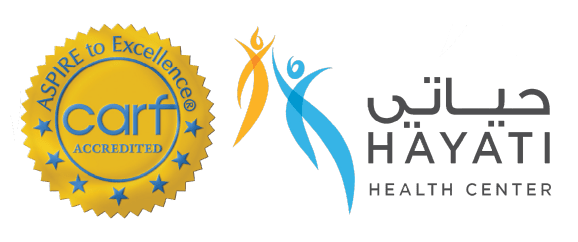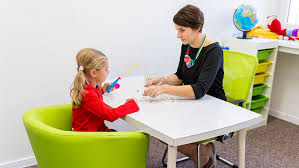Helping to Add ‘Easy’ to Everyday Tasks
Kids who struggle with motor skills can often feel like victims, so it's important to know that the earlier a child starts occupational therapy, the higher their chance of success. At our centers Dubai and Abu Dhabi, Occupational Therapy treatments work to improve fine and gross motor skills.

Improve Range of Motion & Strength Safely
Decrease Pain, While Building Strength
Get Adaptive Strategies & Equipment
Improve Visual Skills
Home to Safety Assessments
Caregiver Training
Our Approach ?
The occupational therapists at Hayati Health Center help a child reach their full potential towards an assistance-free lifestyle. We cater to different levels and severity of cases and treatments are geared for your child's specific needs by assessing their strengths and challenges to identify a suitable program. Occupational therapy may also help with dyslexia, visual processing, executive functioning, and dysgraphia.
FAQ'S
Pediatric occupational therapists provide treatment to help children meet developmental milestones, overcome sensory challenges, and improve self-care, play and self-regulation skills. Occupational therapy can help your child with gross/fine motor skills, visual perception, cognition and activities of daily living.
An individualized evaluation, during which the client and therapist determine goals for treatment, Customized intervention to improve the client’s ability to perform important tasks and life roles that may include hands on treatment of the client as well as modification to task and environment to promote task performance.
Many people are unsure about the relationship between Occupational Therapy and Physiotherapy. There is often confusion about these two professions, and while there are significant differences, there also many grey areas where the two overlap. Both physiotherapists and occupational therapists are trained extensively in the anatomy of the musculoskeletal system resulting in both being knowledgable about musculoskeletal injuries and rehabilitation. Traditionally, Occupational Therapists have focused more on evaluating and improving a person’s functional abilities while the Physiotherapists have tended to focus more on problems with movement. Obviously there is some overlap between the two, and treatment offered by these two professionals is also dependent on the individual therapist’s ongoing education and training. Occupational Therapists and Physiotherapists often work collaboratively in rehabilitation settings.
Occupational therapists are trained in the detailed mechanics of hand function as well as all other aspects that relate to the task of handwriting. The skill of handwriting requires several underlying skills before a child can effectively write. The skills that are needed for handwriting are: Body & Spatial Awareness, Laterality, Directionality, Visual Perception, Visual Motor, Integration, Postural Stability, In Hand Manipulation, Hand Separation, Hand Strength, Movement & Position Awareness, Motor Planning, Ocular Motor Control, Bilateral Integration, Eye Hand Coordination, Sensory Integration, Tactile Discrimination, Memory, Attention, Orientation to Letters, and Sequencing. It is hard to know exactly what is at the root of a handwriting problem without a thorough assessment from an occupational therapist.
Some signs of sensory processing difficulties are:
• Overly sensitive or under reactive to sight, sounds, movement, or touch.
• Can’t get “enough” sensory input: moving, bouncing, squeezing, or mouthing.
• Difficulty with behavioral and/or emotional regulation. Easily overwhelmed (may result in overexcitement, meltdowns or shutting down.)
• Has poor muscle tone, fatigues easily, leans on people, or slumps in a chair. Uses an inappropriate amount of force when handling objects, coloring, writing, or interacting with siblings or pets
• Is clumsy, falls frequently, bumps into furniture or people, and has trouble judging position of body in relation to surrounding space.
• Has difficulty learning new motor tasks; experiences frustration when attempting to follow instructions or sequence steps for an activity.
• Avoids playground activities, physical education class, and/or sports
• Difficulty learning how to play or get along with other children
• Difficulty with everyday activities like eating, sleeping, brushing teeth or getting dressed
• Problems learning to color, cut, draw or write
• Difficulty transitioning from one activity or place to another
• Challenges in school, including attention, organizational perception and listening skills
• Overly sensitive or under reactive to sight, sounds, movement, or touch.
• Can’t get “enough” sensory input: moving, bouncing, squeezing, or mouthing.
• Difficulty with behavioral and/or emotional regulation. Easily overwhelmed (may result in overexcitement, meltdowns or shutting down.)
• Has poor muscle tone, fatigues easily, leans on people, or slumps in a chair. Uses an inappropriate amount of force when handling objects, coloring, writing, or interacting with siblings or pets
• Is clumsy, falls frequently, bumps into furniture or people, and has trouble judging position of body in relation to surrounding space.
• Has difficulty learning new motor tasks; experiences frustration when attempting to follow instructions or sequence steps for an activity.
• Avoids playground activities, physical education class, and/or sports
• Difficulty learning how to play or get along with other children
• Difficulty with everyday activities like eating, sleeping, brushing teeth or getting dressed
• Problems learning to color, cut, draw or write
• Difficulty transitioning from one activity or place to another
• Challenges in school, including attention, organizational perception and listening skills
Sensory defensiveness is a term coined by some OT’s to describe a group of over sensitivities to touch, vision, auditory, movement and smell sensations. Sensory defensiveness is just oversensitivity to certain input. With the term defensiveness, a range of behaviors is implied. These behaviors are the things we can observe that indicate that a sensory input is aversive.
Sensory processing is the initial step of sensory integration. Inputs must be taken in, filtered, and organized before integration can occur. Integration is the final step of an organized response to inputs received. It includes a motor response typically called an adaptive response.
Occupational therapists may provide services to a child who is having difficulty with coordination, handwriting, motor skills, or sensory processing so that he/she may better access the educational and home environment. The therapist utilizes a variety of treatment strategies to support and facilitate motor, sensory, and perceptual development. At Hayati Health Medical Center, we provide a one-to-one basis for the majority of the session, ending occasionally in a small group setting to promote social skills and peer interaction.
Speech therapists (SLPs) know the ins and outs of the oral motor structures and focus on the “act” of eating. If your child is having difficulty chewing/manipulating foods, keeping food in their mouth, taking a long time to chew/swallow, and/or are coughing a lot during meals, an SLP will do your evaluation. Occupational therapists (OTs) know all things sensory. If your child is showing difficulties with specific textures, flavors, colors of foods, temperatures, etc., an OT will do your evaluation. In many cases, children with feeding issues have both oral motor and sensory difficulties.






